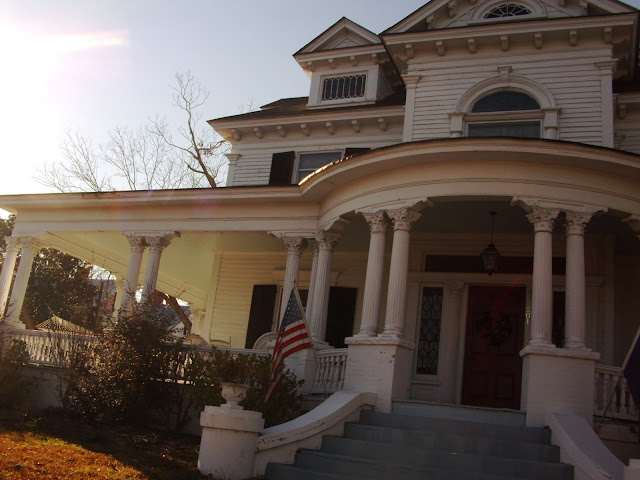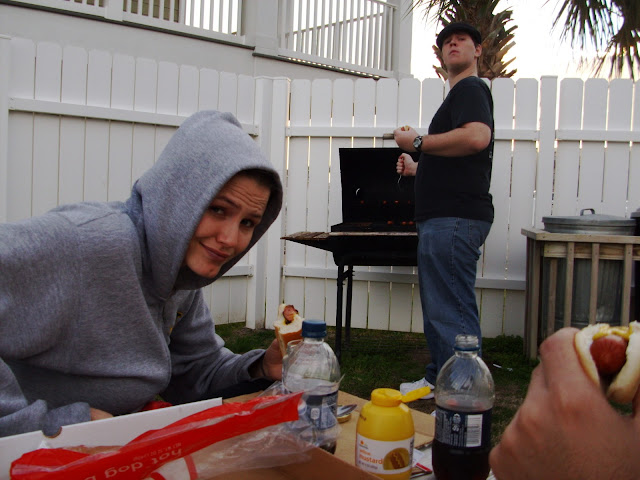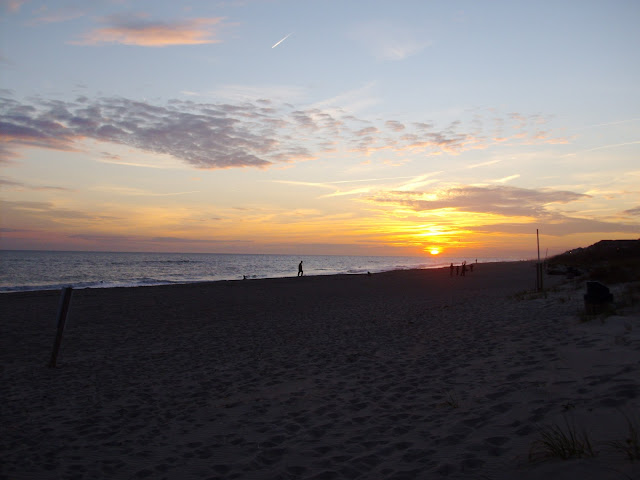1/9/2012
The Pine Knoll Shores Aquarium was good when I was a kid, but now it’s great. As I mentioned yesterday, the aquarium features a range of North Carolina native creatures, from the mountain streams of the west to the offshore ecosystems of the Outer Banks. When the four of us arrived around noon, we found the parking lot nearly deserted, which promised a much more relaxed experience than we ever got in summer or spring.
We read about mountain streams and the creatures that inhabit them, playing “find the frogs” in the little tanks, and ended up by the large river otter tank, which gave underwater views of these sleek mammals. On land they walk with a ridiculous bobbing, as if their midsections are too long for their legs, but once they jump in the water they transform into creatures of superb grace, slipping through the water in a flurry of silver bubbles. One of the three otters loved swimming upside down, flipping himself over with a kick of his back paws before diving to the bottom. We watched them for a good half hour before moving on.
The journey of water continued— from mountain streams to estuaries, grass flats, and saltwater marshes. We took a brief detour to walk outside and view some of the surrounding nature area. The water, at low tide, exposed the mud and tidal grass down to its roots. A few snowy egrets perched on the dead trees nearby, and we watched the tiny minnows swimming in the inches-deep water. Chased inside by the cold, we continued our journey.

Another highlight was the stingray and guitarfish petting area. The last time I had been there, it was a crowded August day, and the poor rays were clustered to the inner part of the tank, buried in the sand, begging with every ounce of their flat-fish bodies that the tourists would go away. Today, however, they swam freely, swooping by to investigate our hands. One of them even took a liking to Ryan. I have always been fascinated by rays, and I took a special interest into the guitarfish, who looked like a sandy, mottled fish that had been run over with a steamroller. They felt bumpy to the touch, while the rays felt smooth to the point of slimy. We chatted with the keeper, who told us that rays have an excellent sense of sight. I crouched down by the glass and looked one in the eye. I wondered how he perceived me, and if I was as fascinating to him as he was to me.
We also got the chance to pet some horseshoe crabs, creatures of another eon, as well as hermit crabs and whelks. Fascinated, we looked at the displays of seahorses, pipefish, reef-fish and jellies. In good time, we reached the 306,000-gallon tank with the 65-foot-long viewing window. The water alone weighs over two million pounds, and a keeper informed us that there are over 800 creatures in the tank. We sat and watched the schools of fish the size of my torso, the clusters of smaller fish darting in and out, and the massive sharks— nurse with their tiny blank eyes and sand tigers with their open-mouthed stare and protruding teeth— drifting through. A green moray eel, six feet long, lurked in a corner and snaked out occasionally with mouth agape to impress the visitors. After a few minutes, we were surprised to see three divers enter the tank, floating in among the sharks to check… something (we never did figure out what). They waved at us, and Ryan played a game of paper-scissors-rock with one.

From the massive tank, we moved to displays highlighting the life on the miniature reefs that form on wrecks and piers (North Carolina’s coast is too sandy to support a true coral reef). I watched some jellyfish, fascinated by their tentacles, thin as strands of melted cheese. It looked as if the slightest touch could break them, yet these creatures— with no brain or heart— withstand the power of the ocean.

Next I turned to admire a display featuring five lionfish, venomous fish with leafy fins and tiger-like stripes (was the name “tigerfish” already taken?). I followed one around the circular tank, watching his fins, intricate as leaves, move the water to let him propel forward. The delicate movement of his gills fascinated me. Mary came up beside me and I started to say, “They’re so beautiful.” As I spoke, the lionfish’s tail fin drifted right past my eyes. I caught every detail of that moment: the fine brown ribs, the translucent webbing as delicate as spiderweb, the dark spots like drops of acrylic. My last word choked, and I felt a sob of joy rising in my throat. Just yesterday, I had been sad that I don’t feel things as deeply as I used to. But joy comes at unexpected moments, even in lionfish fins.
~
I didn’t want to go to Fort Macon. It was raining, and as far as I remembered, there was nothing to the fort except a shell of a brick building in the earth with nowhere warm or dry to sit. But I was outvoted three to one, and it’s a good thing I was. Not only was the fort full of indoor rooms with heating (I had forgotten the fort was closed last time we visited), but also contained interpretive displays, informational plaques, several creepy mannequins in Civil War uniforms, audio monologues about history and everyday life, and a video about the fort’s history. A veteran of three wars— the War Between the States, the Spanish-American War, and World War II— Fort Macon has been restored to a place where the memory of life in the 19th century is kept alive.

The Confederates “captured” the fort in 1861 (really, they just marched up to the gates and told the single, unarmed caretaker to move to Beaufort) and held it for a year before the Union came to take it back. After a siege in which the Confederates were hopelessly outgunned, the 27-year-old commandant of the fort, Colonel Moses J. White, surrendered. There was a picture of him in one room. Clean-shaven, long-haired, with a handsome face and the hunted look of someone dealing with an untreatable disease (his epilepsy took his life two years after the siege), he looked like a man that I would like to meet someday. He seemed like a true Southerner, graceful, dutiful, and full of pride.
As much as I admit that the Union winning the Civil War was a good thing, my heart always softens to the Confederates. I know these are my family roots, running deep into North Carolina and Virginia. I imagine my ancestors— poor as dirt or else horse thieves on the run from the law, as the records seem to show— sending their sons off to battle and praying for their safe return. As a child, I always thought that war would make more sense when I got older. The older I get, the less sense it makes.
Although the histories of conflict are interesting to me, I was most fascinated by the descriptions about everyday life in the fort. A display about laundry caught my attention. In the 1800s, washing clothes was an arduous task involving mending, specific sorting, a day of soaking, hand agitation and scrubbing, different chemicals for different kinds of discoloring, special handling when drying each kind of material, and the tricky technique of using an iron heated on a stove. It made me think about how much time and effort everything took just a century and a half ago. What would they think if they saw a washing machine, an electric stove or a smartphone? And how many of we modern people would not survive if we were dropped into the middle of antebellum North Carolina?

The sky had cleared a bit by the time we were finished walking through the displays, so we strolled along the top of the fort, trying to visualize where the Union cannons had been set. A chill, wet wind whipped around me, and I thought about the soldiers facing the sea and thinking of their sweethearts, their families, and what they would do when all this was over.
Safe in the warmth of the car, we trucked over to the mainland and found a Pizza Hut. As I chomped down on the Pepperoni Lover’s with extra cheese, I didn’t think about how long it would have taken to make this in the 1800s. My modern brain had taken over, a brain that consumes without thought, that has no connection to source of anything, be it food, supplies, or electronics. Now, back in the hotel room writing this blog, it makes me think. If I could live for a day like those in the Civil War, just a day, what would I learn?
~
Yesterday was a day of knowledge, memory, delight and open-eyed wonder. It was a reminder of the beauty of creation, the hardship of life, and the breathtaking details that make everything worth learning.
~~~
 La Jolla has a little inlet along its rocky shore, a sheltered area where parents take their children to swim… until the seals move in. From a manmade levy, I saw harbor seals up closer than I ever have before. They lounged on rocks and sand, fat and shiny, on their backs or sides, occasionally moving to situate their blubbery bodies, rub their webbed feet together, or yawn with a great twitching of their long white whiskers. A baby, trying to nurse its mother, rolled her over like a sausage as it tried to find the teat. Nearby in the water, pups and adults alike played and fished in the water, their heads bobbing in and out of the sunset ripples. I wish my camera could capture their silly beauty. I wish that my words could describe them the way they deserve.
La Jolla has a little inlet along its rocky shore, a sheltered area where parents take their children to swim… until the seals move in. From a manmade levy, I saw harbor seals up closer than I ever have before. They lounged on rocks and sand, fat and shiny, on their backs or sides, occasionally moving to situate their blubbery bodies, rub their webbed feet together, or yawn with a great twitching of their long white whiskers. A baby, trying to nurse its mother, rolled her over like a sausage as it tried to find the teat. Nearby in the water, pups and adults alike played and fished in the water, their heads bobbing in and out of the sunset ripples. I wish my camera could capture their silly beauty. I wish that my words could describe them the way they deserve.


































